

Twitter: towards more fluid rules of academic engagement. "It's a conversation, not a lecture" was the title given to a blog I wrote for the Higher Education Network back in September 2011.
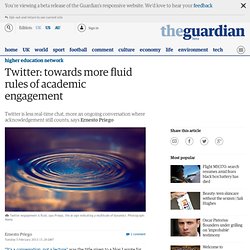
It seems like quite a long time ago now! I still believe in the need to ensure Twitter remains a public, potentially more democratic, online space where the playing field is, to a certain extent, levelled. Engagement and reciprocity are defining and built-in features of the Twitter platform – the @ sign indicating location and response, invocation, evocation, address, acknowledgement and recognition.
Nevertheless, it seems important to clarify what I meant by 'a conversation' and that was not necessarily a real-time, chatroom style exchange of written messages. Immediate interaction is one structural element that defines Twitter as a medium and as a tool, but this does not erase the external demands that define our circumstances as human individuals working behind a computer or mobile device in real time and place. Digital identity, privacy & authenticity - #CESI12.
Research. Managing Your Online Image Across Social Networks « The Reppler Effect. Timbuckteeth: Patterns of digital identi... Visitorsandresidentsinterim report.pdf (application/pdf Object) Price. Glamorgan - SLiDA Case Studies - Brookes Wiki. Background.
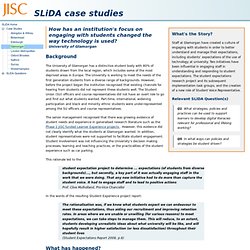
Students_Guide_to_Personal_Publishing.pdf (application/pdf Object) Seven reasons teachers should blog. 1) Blogging causes you to reflect.
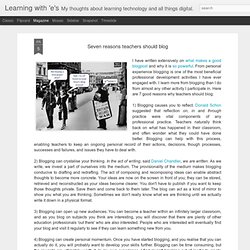
Donald Schon suggested that reflection on, in and through practice were vital components of any professional practice. Teachers naturally think back on what has happened in their classroom, and often wonder what they could have done better. Blogging can help with this process, enabling teachers to keep an ongoing personal record of their actions, decisions, though processes, successes and failures, and issues they have to deal with. Digital Visitors and Residents [OCLC - Activities] The University of Oxford and OCLC Research, in partnership with the University of North Carolina, Charlotte, are collaborating on a JISC-funded study to investigate the theory of digital residents and visitors with learners in the educational stages: Emerging (Late stage secondary school-first year undergraduate); Establishing (Second/third year undergraduate); Embedding (Postgraduates, PhD students); and Experienced (Scholars).
![Digital Visitors and Residents [OCLC - Activities]](http://cdn.pearltrees.com/s/pic/th/digital-visitors-and-residents-40212558)
This work will increase understanding of how learners engage with the Web and how educational services and systems can attract and sustain a possible new group of lifelong learners. The trans-Atlantic partnership will support comparison of students' digital learning strategies in different cultural contexts. Further details... Outputs currently available Interim Reports to JISC June 2012 Progress Report 22 July 2011 (.pdf: 560K/13 pp.) Deciphering student search behaviour - SEARCH. A new study reveals how students conceal their real search strategies from their tutors.
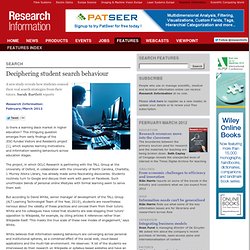
Sarah Bartlett reports Is there a learning black market in higher education? Visitors and Residents: What Motivates Engagement with the Digital Information Environment? Building on research of individuals’ modes of engagement with the web (Visitors and Residents4), and the JISC-funded Digital Information Seeker report5, this project is exploring what motivates different types of engagement with the digital environment for learning.
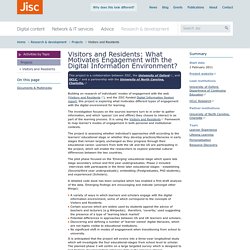
The investigation focuses on the sources learners turn to in order to gather information, and which ‘spaces’ (on and offline) they choose to interact in as part of the learning process. It is using the Visitors and Residents6 framework to map learner’s modes of engagement in both personal and institutional contexts.
The project is assessing whether individual’s approaches shift according to the learners’ educational stage or whether they develop practices/literacies in early stages that remain largely unchanged as they progress through their educational career. The pilot phase focused on the ‘Emerging’ educational stage which spans late stage secondary school and first year undergraduates. Objectives Reports. Technoliteracy. About Me Steve Wheeler I'm Associate Professor of learning technology in the Plymouth Institute of Education at Plymouth University.
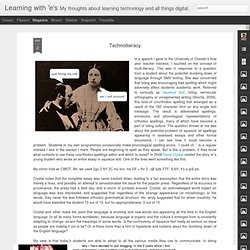
Social Media Report From Auckland Students updated. 1.
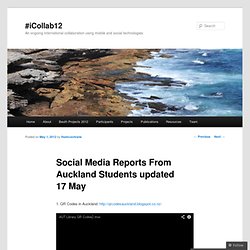
QR Codes in Auckland: 2. Our Auckland: 3. The Localist: Updated YouTube link: A YouTube summary – please rate the video and give comment feedback :-) App Users Now Spend As Much Time Social Networking As Playing Games, Says Report [STUDY] OverDrive Data Shows Majority Still Like to Browse the Virtual Shelves. OverDrive released its first “Big Data” report at the London Book Fair, a snapshot of the library ebook platform’s March traffic.
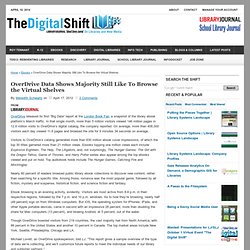
In that single month, more than 5 million visitors viewed 146 million pages in 12.6 million visits to OverDrive’s digital catalog, the company reported. On average, more than 408,000 visitors each day viewed 11.6 pages and browsed the site for 9 minutes 34 seconds on average. Visitors to OverDrive’s catalog generated more than 630 million ebook cover impressions, of which the top 30 titles garnered more than 21 million views.
Ebooks topping one million views each include Explosive Eighteen, The Help, The Litigators, and, not surprisingly, The Hunger Games. The Girl with the Dragon Tattoo, Game of Thrones, and Harry Potter series also appear among the top ebooks viewed and put on hold. Nearly 60 percent of readers browsed public library ebook collections to discover new content, rather than searching for a specific title.